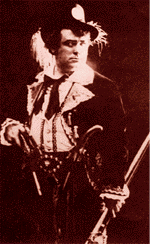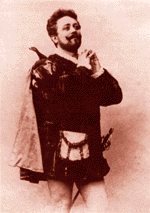
Autobiography
Memoirs (excerpts)
Brno – the first conductor
Estonia – Reval (Tallin today)
Leipzig – Staegemann
Three seasons on Rhine
Hannover – Hamburg
GALERIE
Recordings, Photos

12.1.1870 Rousínov by Rakovník – 25.9.1924 Senomaty, his mother country
In the world known as Carl (Karl) Burrian


As a student I knew only one thing: Jurae ad verba magistri. The rising artist never suppressed the philologist and the philologists helped the artist later on… (Wagner!). As an apprentice I knew no limits or self-control. Brno, Reval and – Leipzig – what a leap! Art knows no leaps…
My three years on the Rhine balanced what I wanted to jump over in my self-deceit. There was the pure work, full of suffering, injustice, doubts and hopes. I hammered all the Leipzigs and Berlins out of my head and how great it was in Aachen! That small old theatre, with the antique piling – unforgettable! That small old director Ernst, who as an intendant at the Court Opera in Berlin saw better days – unforgettable!…
…There were two guys (Goetze and Birrenkoven), who were my predecessors in Cologne and Hoffmann wanted to make a third one out of me, a twenty-three old year youngster, overnight! Lyonel, Maurice, Raoul, Arnold and such “literature” was supposed to help me develop into a commis voyageur as Goetze was. Fortunately and despite my voice strengths, my singing skills were not developed to such an extent as to keep balance with several fine high tones – those were all my armory for the time being. Thus I remained an ordinary member of the ensemble and watched attentively what and where I could pick up something or learn by watching.
 Two figures attracted all my efforts in particular – the famous theatrical singer Moran-Olden and an excellent singing master, tenor Kalisch, husband of a more famous wife Lilli Lehman. If Moran-Olden was my role model for drama, then Kalisch was the same to me for the technique. A book could be written about how this artist could control his naturally poorly equipped voice! He could produce such beautiful tones of rich nuances out of his dry, resistant and rigid voice with his technique that I can still hear them now… Whoever heard Eleazar’s prayer sang by Kalisch – the beginning of the second act with “Omnipotent, look down from the highness” in his inimitable mezza-voce or then the big aria with the stretta in the fourth – can only smilingly shrug his shoulders at the present “C” athletes. … Kalisch could manage anything, Kalisch was not a specialist. Caruso specializes in Puccini, Bonci in Donizetti, Slezák in Meyerbeer, Knote in Wagner – but Kalisch could do them all! His voice was his curse – out of such voice Caruso for instance could not have produced even his: Ridi, Pagliaccio,…
Two figures attracted all my efforts in particular – the famous theatrical singer Moran-Olden and an excellent singing master, tenor Kalisch, husband of a more famous wife Lilli Lehman. If Moran-Olden was my role model for drama, then Kalisch was the same to me for the technique. A book could be written about how this artist could control his naturally poorly equipped voice! He could produce such beautiful tones of rich nuances out of his dry, resistant and rigid voice with his technique that I can still hear them now… Whoever heard Eleazar’s prayer sang by Kalisch – the beginning of the second act with “Omnipotent, look down from the highness” in his inimitable mezza-voce or then the big aria with the stretta in the fourth – can only smilingly shrug his shoulders at the present “C” athletes. … Kalisch could manage anything, Kalisch was not a specialist. Caruso specializes in Puccini, Bonci in Donizetti, Slezák in Meyerbeer, Knote in Wagner – but Kalisch could do them all! His voice was his curse – out of such voice Caruso for instance could not have produced even his: Ridi, Pagliaccio,…
… If I ever learnt anything from a theatrical artist, it was mostly from Kalisch. My career that opened up soon after Cologne for me only proves that I was a diligent and skilful student, who in two years managed to alternate most of the parts with his Cologne master in Hamburg.
New York, January 1912, photo: K. B. as Jean in „Les Huguenots“
Literature: Burian K.: Paměti (Smetana, Praha, ročníky 1911 - 1912); Hradčanský J. V.: Komorní pěvec Karel Burian ve svých veršovaných dopisech (Graf. ústav L. Beneše, Český Brod, 193?); Hradčanský J. V.: Komorní pěvec Karel Burian ve svých veršovaných dopisech (Fr. A. Urbánek a synové, Praha, 1933); Burian E. F.: Karel Burian (Praha 1948); Novotný A.: Pěvecký portrét (Supraphon, Praha 1974); Wenig J.: Ema Destinová - Karel Burian (Supraphon, Praha, 1960); Nejedlý Z.: Dějiny opery Národního divadla I.-II. (Praha, 1949); Rektorys A.: Naši operní pěvci, (Praha 1958); Černý J.: Osmý den (Reflex, Praha, 6. 3. 2003)
Realisation: Boris Klepal, translation: Petra Mutlová
Thanks to Miloš Klepal and Alena Švecová.
Questions, Informatios, Responses